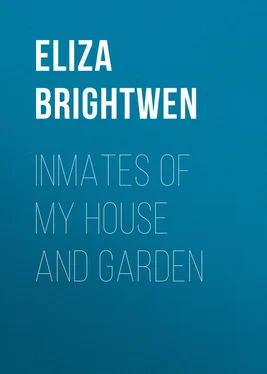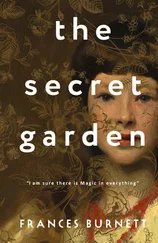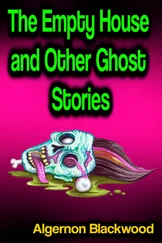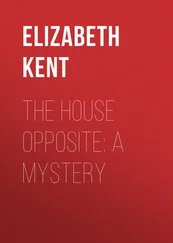Eliza Brightwen - Inmates of my House and Garden
Здесь есть возможность читать онлайн «Eliza Brightwen - Inmates of my House and Garden» — ознакомительный отрывок электронной книги совершенно бесплатно, а после прочтения отрывка купить полную версию. В некоторых случаях можно слушать аудио, скачать через торрент в формате fb2 и присутствует краткое содержание. Жанр: foreign_antique, foreign_prose, на английском языке. Описание произведения, (предисловие) а так же отзывы посетителей доступны на портале библиотеки ЛибКат.
- Название:Inmates of my House and Garden
- Автор:
- Жанр:
- Год:неизвестен
- ISBN:нет данных
- Рейтинг книги:3 / 5. Голосов: 1
-
Избранное:Добавить в избранное
- Отзывы:
-
Ваша оценка:
- 60
- 1
- 2
- 3
- 4
- 5
Inmates of my House and Garden: краткое содержание, описание и аннотация
Предлагаем к чтению аннотацию, описание, краткое содержание или предисловие (зависит от того, что написал сам автор книги «Inmates of my House and Garden»). Если вы не нашли необходимую информацию о книге — напишите в комментариях, мы постараемся отыскать её.
Inmates of my House and Garden — читать онлайн ознакомительный отрывок
Ниже представлен текст книги, разбитый по страницам. Система сохранения места последней прочитанной страницы, позволяет с удобством читать онлайн бесплатно книгу «Inmates of my House and Garden», без необходимости каждый раз заново искать на чём Вы остановились. Поставьте закладку, и сможете в любой момент перейти на страницу, на которой закончили чтение.
Интервал:
Закладка:
I had only a few minutes in which to decide whether the poor little animal must be put out of his misery at once or if there might be hope, by skilful amputation, of ultimate recovery. I am sure that all lovers of animals will understand the keen distress I felt at having to make such a decision, but something must be done, and as I found I could not give the death warrant, Mungo was taken to the veterinary doctor, with injunctions to spare no pains in trying to save the patient all needless suffering. Two surgeons attended to the case, and whilst under chloroform the little animal was relieved of the injured paw, and must have been remarkably well treated, for I was soon informed that Mungo was doing well and would take some “bird” for his dinner! In about a fortnight he was brought home and looked very pitiful, limping about on three legs. It was long before I could become accustomed to see him thus, but so well did the wound heal that now the limp can hardly be observed, and the little creature is as merry as ever, scampering about and playing with his own tail as lively as any kitten.
It has been an interest to me to make a study of the character of my mongoose, for a wild creature rendered perfectly tame by unvarying kind treatment gives one an excellent opportunity of observing the real nature of the animal.
I fear I must own that Mungo is absolutely selfish, his one idea is to enjoy perfect liberty and have his own way in everything. After four years’ petting he knows me well as his friend and purveyor, but he has not an atom of affection; he has, apparently, no mode of manifesting regard, the expression of his face never alters, he does not try to lick my hand or make any greeting sound. He likes to jump into my lap simply because it is a comfortable place, and, as he is very timid at any unwonted noise, he will run to me for protection, but I am afraid he views me as a means of attaining physical comfort, food, and warmth, and nothing more!
All this does not prevent my liking the curious little animal, but one cannot but be struck by the immense difference between its nature and that of the faithful dog, whose devotion to his master will lead him to refuse his food, to take long, toilsome journeys, to wait patiently for weary hours in cold wind and biting frost when bidden to guard his owner’s flock, aye, and even to yield up his life, if necessary, to do his master service.
All this shows, what I have often remarked before, that, to those who are observant of the fact, there is as much difference between the characters of various animals, and even between those of individuals of the same species, as may be found in human beings.
Possibly Mungo may be a selfish specimen of his race, and there may exist brilliant exceptions abounding in affection and other noble qualities. I can only describe him as he is, and, judging by his small cranium and its peculiarly flattened formation, I should imagine he is formed to be, not a pattern of all the virtues, but a creature of one idea, and that – snake-killing! To be proficient in that art all the characteristics I have noted in this animal are specially needed, such as lynx-like watchfulness, undaunted courage in fight, persistent curiosity and determination to care for himself under all circumstances.
We must therefore wink at his failure in moral goodness, and admire the way in which he carries out the purpose for which he was made. He worthily adorns his own special niche in Creation.
SQUIRRELS WON BY KINDNESS
“Drawn from his refuge in some lonely elm,
That age or injury has hollowed deep,
Where, on his bed of wool and matted leaves,
He has outslept the winter, ventures forth
To frisk a while, and bask in the warm sun,
The squirrel, flippant, pert, and full of play:
He sees me, and at once, swift as a bird,
Ascends the neighbouring beech; there whisks his brush,
And perks his ears, and stamps and scolds aloud.”
Cowper.ABOUT ten years ago we began taming the wild squirrels which exist in great numbers in the woods around this house. We put Barcelona nuts in a small basket outside the dining-room window, and every day a handful thrown on the ground served to attract the notice of the little animals. In a very short time the squirrels ventured to approach, timidly at first, picking up their favourite food; they would scratch up the nuts and rush away to some quiet spot out of sight.
Generations of the graceful little rodents have been trained to come nearer and nearer to the window, until they are now so delightfully tame that I feel induced to suggest to others the means of enjoying the pleasure we find in watching our daily visitors from the woods.
My first act before breakfast is to place a handful of nuts on a small table which stands in the room close to a bay window. Hardly have I done so when in come the squirrels, sliding up to the window and leaping on to the table to enjoy the nuts. They will take nuts gently from our hands, and sitting up in the graceful position a squirrel adopts when quite at ease – its tail curved over its back, and its tiny paws holding the nut – they crack them and fling away the shells in careless fashion. A scrimmage sometimes takes place when several come in together; one bolder spirit will chase another round the room until both spring out at the window and dart across the lawn. At length the nuts on the table being eaten or carried away, the squirrels, well knowing where the supply is kept, descend to the floor and hop leisurely to a cupboard, where on the first shelf is a box full of Barcelonas. The little animals spring on to the shelf and help themselves. This they are allowed to do for a little while, as we like to watch their proceedings; but I make a protest presently, and close the cupboard door when I find my entire stock of nuts being transferred to the garden and planted all over the lawn, for the squirrels bury nuts for future use, although I am very doubtful whether they do really dig them up again.
On cold mornings when the windows cannot be opened, it is touching to see the little furry heads peep through the pane, waiting patiently for their daily meal. This they eventually share with several very tame nuthatches; these birds seeming very glad of nuts as well as fat during the winter months.
The only drawback to having wild squirrels tamed is the distraction they cause when a class of village children is being taught in the dining-room! Sydney Smith says: “A sparrow fluttering about the church is an antagonist which the most profound theologian in Europe is wholly unable to overcome,” and certainly the apparition of a bright-eyed squirrel popping up at each window in succession is enough to drive a teacher to despair. Nothing less than an abundant shower of nuts will bribe the little intruders to keep quiet for a time.
I have given these simple details because I think that possibly many of my readers may like to encourage those charming little animals when they learn how easily, by a little patient kindness, they may be attracted from the woods to become household pets of their own free will, which is, to my mind, so much more enjoyable than keeping captive animals or birds. It should, perhaps, be added that great quietness and calm are needed while the first advances are being made, and that a loud voice or a quick gesture will undo a week’s work in taming.
A “FAIRY” STORY
“I joyed to hear her own peculiar note
Through all the music float;
But when the gentle song, that streamed away,
Like some enamoured rivulet that flows
Under a night of leaves and flowering may,
Died on the stress of its own lovely pain,
Even as it died away,
It seemed as if no influence could restrain
The notes from welling in the whitethroat’s brain.”
Интервал:
Закладка:
Похожие книги на «Inmates of my House and Garden»
Представляем Вашему вниманию похожие книги на «Inmates of my House and Garden» списком для выбора. Мы отобрали схожую по названию и смыслу литературу в надежде предоставить читателям больше вариантов отыскать новые, интересные, ещё непрочитанные произведения.
Обсуждение, отзывы о книге «Inmates of my House and Garden» и просто собственные мнения читателей. Оставьте ваши комментарии, напишите, что Вы думаете о произведении, его смысле или главных героях. Укажите что конкретно понравилось, а что нет, и почему Вы так считаете.












